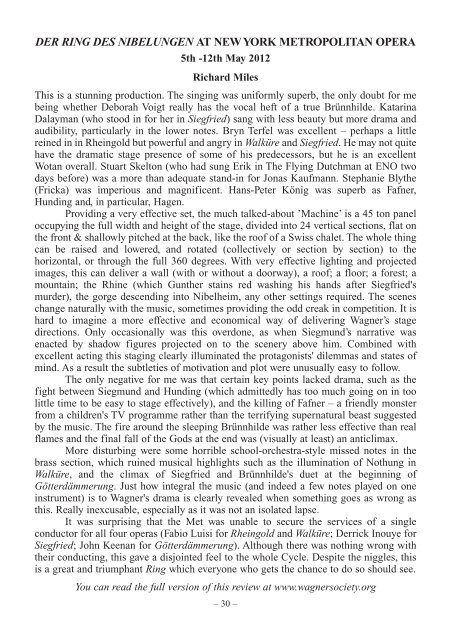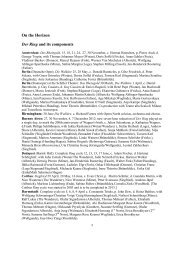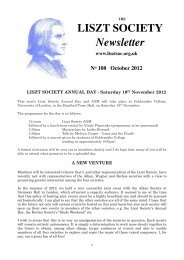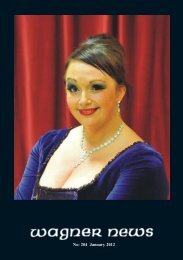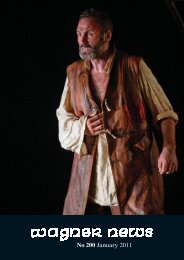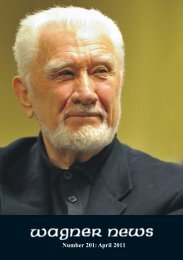13895 Wagner News 174 - Wagner Society of England
13895 Wagner News 174 - Wagner Society of England
13895 Wagner News 174 - Wagner Society of England
You also want an ePaper? Increase the reach of your titles
YUMPU automatically turns print PDFs into web optimized ePapers that Google loves.
DER RING DES NIBELUNGEN AT NEW YORK METROPOLITAN OPERA<br />
5th -12th May 2012<br />
Richard Miles<br />
This is a stunning production. The singing was uniformly superb, the only doubt for me<br />
being whether Deborah Voigt really has the vocal heft <strong>of</strong> a true Brünnhilde. Katarina<br />
Dalayman (who stood in for her in Siegfried) sang with less beauty but more drama and<br />
audibility, particularly in the lower notes. Bryn Terfel was excellent – perhaps a little<br />
reined in in Rheingold but powerful and angry in Walküre and Siegfried. He may not quite<br />
have the dramatic stage presence <strong>of</strong> some <strong>of</strong> his predecessors, but he is an excellent<br />
Wotan overall. Stuart Skelton (who had sung Erik in The Flying Dutchman at ENO two<br />
days before) was a more than adequate stand-in for Jonas Kaufmann. Stephanie Blythe<br />
(Fricka) was imperious and magnificent. Hans-Peter König was superb as Fafner,<br />
Hunding and, in particular, Hagen.<br />
Providing a very effective set, the much talked-about ’Machine’ is a 45 ton panel<br />
occupying the full width and height <strong>of</strong> the stage, divided into 24 vertical sections, flat on<br />
the front & shallowly pitched at the back, like the ro<strong>of</strong> <strong>of</strong> a Swiss chalet. The whole thing<br />
can be raised and lowered, and rotated (collectively or section by section) to the<br />
horizontal, or through the full 360 degrees. With very effective lighting and projected<br />
images, this can deliver a wall (with or without a doorway), a ro<strong>of</strong>; a floor; a forest; a<br />
mountain; the Rhine (which Gunther stains red washing his hands after Siegfried's<br />
murder), the gorge descending into Nibelheim, any other settings required. The scenes<br />
change naturally with the music, sometimes providing the odd creak in competition. It is<br />
hard to imagine a more effective and economical way <strong>of</strong> delivering <strong>Wagner</strong>’s stage<br />
directions. Only occasionally was this overdone, as when Siegmund’s narrative was<br />
enacted by shadow figures projected on to the scenery above him. Combined with<br />
excellent acting this staging clearly illuminated the protagonists' dilemmas and states <strong>of</strong><br />
mind. As a result the subtleties <strong>of</strong> motivation and plot were unusually easy to follow.<br />
The only negative for me was that certain key points lacked drama, such as the<br />
fight between Siegmund and Hunding (which admittedly has too much going on in too<br />
little time to be easy to stage effectively), and the killing <strong>of</strong> Fafner – a friendly monster<br />
from a children's TV programme rather than the terrifying supernatural beast suggested<br />
by the music. The fire around the sleeping Brünnhilde was rather less effective than real<br />
flames and the final fall <strong>of</strong> the Gods at the end was (visually at least) an anticlimax.<br />
More disturbing were some horrible school-orchestra-style missed notes in the<br />
brass section, which ruined musical highlights such as the illumination <strong>of</strong> Nothung in<br />
Walküre, and the climax <strong>of</strong> Siegfried and Brünnhilde's duet at the beginning <strong>of</strong><br />
Götterdämmerung. Just how integral the music (and indeed a few notes played on one<br />
instrument) is to <strong>Wagner</strong>'s drama is clearly revealed when something goes as wrong as<br />
this. Really inexcusable, especially as it was not an isolated lapse.<br />
It was surprising that the Met was unable to secure the services <strong>of</strong> a single<br />
conductor for all four operas (Fabio Luisi for Rheingold and Walküre; Derrick Inouye for<br />
Siegfried; John Keenan for Götterdämmerung). Although there was nothing wrong with<br />
their conducting, this gave a disjointed feel to the whole Cycle. Despite the niggles, this<br />
is a great and triumphant Ring which everyone who gets the chance to do so should see.<br />
You can read the full version <strong>of</strong> this review at www.wagnersociety.org<br />
– 30 –


